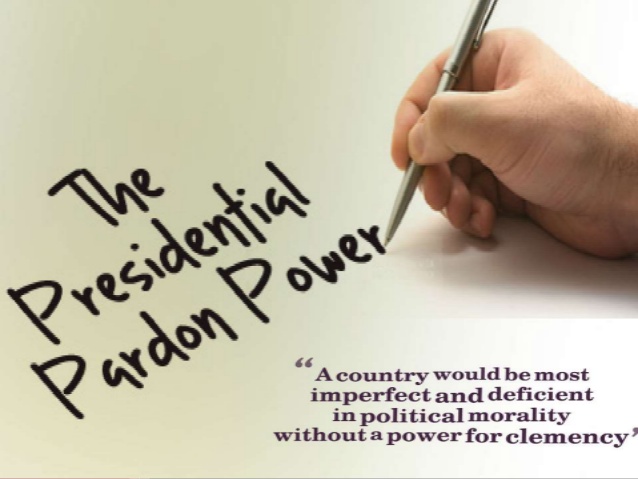This article is written by Ronika Tater from the University of Petroleum and Energy Studies, School of Law. In this article, she discusses the constitutional provisions in relation to the pardoning powers of the President with the support of various case laws and other relevant provisions.
Table of Contents
Introduction
The Constitution of India comprises the three branches of the government namely the legislative, the executive and the judiciary. The head of the executive is the president, who is the first citizen of India and the Constitution entails various powers in it. Under Article 72 of the Constitution of India which states that the President shall have the power to grant pardons, reprieves, respites, or remissions of punishments or to suspend, remit or commute the sentence of any person convicted of any offence under The Indian Penal Code, 1860 (“IPC”) where the sentence is a sentence of death. Under Article 161 of the Constitution of India which states the power of pardoning by the Governor, however, these do not extend to death sentences.
History behind the President’s power to grant pardon
During the British reign, the power of pardon was vested in the British monarch. This power was absolute, unrestrained and not subject to any judicial scrutiny. It was considered as an act of mercy at the hands of the King to forgive any crime, offence, punishment, execution, right, or duty. Consequently, the constitutional framers have stated the position of the President in the Constitution as symbolic and the Central Government is the reality. In the same case, the Governor is the formal head and the sole repository of the executive power, but it acts upon the advice of the Council of Ministers. Article 74 of the Constitution of India provides that the Council of Ministers with the Prime Minister at the head shall aid and advise the President while exercising its function and the President should act as per such advice. The action of commutation, pardons, and release is not open to the President or the Governor to take independent decisions and directly release anyone of their choice. While drafting the criminal provision with regard to the existence of capital punishment the framers of the Constitution were known that it is a permissible punishment under the law and also has been in existence from ancient times.
Article 72(1)(c) provides the President with the power to grant pardons to any person convicted of any offence and also in all cases where the sentence is a sentence of death. On the contrary, Article 72(3) provides that the President’s power to grant power shall not affect the Governor of a State as mentioned under the law. Article 134 provides the right of appeal to the Supreme Court in the cases where the High Court reversed an order of acquittal and grants a person capital sentence. Thus, the constitutional framers recognize the death sentence as a permissible punishment. On the contrary, Article 21 of the Constitution of India states that no person shall be deprived of his life except in the cases where the procedure established by law is followed. It is clear that the deprivation of law is constitutionally valid if done according to the procedure established by law. Hence, the provision for capital sentences cannot be said as unreasonable or not in the public interest.
Hence, in the case of Devender Pal Singh Bhullar v. State of NCT of Delhi, (2013), it was held that the powers under Article 72 and Article 161 are the two highest dignitaries in the Constitution should act with the aid and advice of the ministers. It also stated that the Governor is a shorthand expression for the State Government and the President for the Central Government. However, the constitutional status stated in Article 72 and Article 161 does not get affected by the common ground mentioned under Section 433-A of the Code of Criminal Procedure, 1973 (“CrPC”). Section 433A states the restriction on the power of remission or commutation on certain cases where a death sentence is imposed on a person and has been commuted to imprisonment for life. In such circumstances, the person convicted must at least spend fourteen years of imprisonment.
Different types of pardoning powers
Article 72 of the Constitution provides the five different types of pardoning power of the President as mandated by the law.
- Pardon means completely resolving both the conviction and sentence and letting him go free from the hands of the law. In such circumstances, the pardoned criminal will be treated just like a normal citizen.
- Commutation means changing the type of punishment given to the convicted person at the time of conviction. In other cases, the power extends to the Government of the State. Section 433 of the Code of Criminal Procedure, 1973 provides the power of the appropriate government to commute the sentence of a person without consent in the following cases.
- A sentence of death may be commuted to any other punishment as mentioned under the IPC.
- A sentence of imprisonment for life commuted for imprisonment for a term not exceeding fourteen years or for a fine.
- A sentence of rigorous imprisonment commuted for simple imprisonment for any term or a fine.
- A sentence of simple imprisonment commuted for a fine.
The expression “appropriate Government” means in cases where the sentence is for an offence that restricts the liberty of any person or imposes any liability or on his property is passed under any law. The power in such related matters extends to the executive power of the Union, the Central Government.
- A reprieve means a delay allowed in the execution of a sentence especially that for a death sentence for a temporary period. The purpose of it enables the guilty person to seek presidential pardon or any other legal remedy to prove himself innocent.
- Respite which means reducing the quantum or degree of punishment of the convicted person considering special circumstances such as in the case of pregnancy, the death penalty may be commuted to imprisonment for life.
- Remission means changing the quantum of the punishment without changing its nature. Section 432 of the Code of Criminal Procedure, 1973 provides the power to suspend or remit sentences of punishment by the appropriate government. It states that the appropriate government with or without conditions may at any time accept, suspend or remit the punishment for an offence wholly or any part of the punishment.
Case laws
In the case of Ram Shankar v. State of Madhya Pradesh, (1981), the Supreme Court held that the government may remit or reduce sentences while exercising the power of clemency after considering the facts and circumstances of the case.
- That the accused is a primary school teacher with no bad history of conviction.
- The amount robbed by him was a trivial amount.
- There was no resistance or hiding of his identity while arresting.
In a similar case, Shidagauda Nilgappa Ghandakar v. the State of Karnataka, (1981), the Supreme Court while upholding the validity of Section 433 of the Cr. P.C held that the Government cannot reduce or commute the sentence to less than 14 years for a crime of serious nature.
Nature of the pardoning power
The pardoning power of the President is not absolute. It should be exercised by the President on the advice of the Council of Ministers. However, Article 74(1) empowers the President to return it for reconsideration once. If the Council of Ministers decided against it, the President has no option but to abide by it. In several cases, the Supreme Court has ruled that the President has to act on the advice of the Council of Ministers. These include Maru Ram v. Union of India, (1980), the Supreme Court held that the power under Article 72 is not an independent power of the President but it is to be exercised on the advice of the Central Government and that the advice of the Government binds the head of the Republic to act upon it. The case of, Epuru Sudhakar v. Government of Andhra Pradesh, (2006), established a well-set principle stating that a limited judicial review while exercising clemency powers is available to the Supreme Courts and High Courts. Granting of clemency by the President or Governor can be challenged based on the following grounds:
- The order has been passed without application of mind.
- The order passed is mala fide.
- The order passed is wholly irrelevant and extraneous.
- Relevant material has not been considered.
- The order passed suffers from arbitrariness.
Impact of the judiciary on clemency power
The Constitution of India provides the separation of power between the three branches of the government and each branch should function under its sphere. In the cases of extreme inhumane treatment against the rights of the citizen, the judiciary can come into the picture to uphold constitutional morals and values. In the context of Article 71 and Article 161 of the Constitution of India, the judiciary has a limited sphere by allowing judicial review. In the recent case of Shatrughan Chauhan v. Union of India, (2014), the Supreme Court held that the petition filed by 15 prisoners whose mercy got rejected while exercising the pardoning under Article 72 without providing any reason for undue delay is a violation of Article 21. It provided guidelines in order to ensure that while carrying out death sentences a more humane process should be adopted. It was unacceptable that the right to life of the prisoners is subjected to torture due to delay in the rejection of the mercy petition.
Further, the Court while commuting the death sentences stated that it is not questioning the power of the President in the Constitution to reject the mercy petition. Though the Court exercised limited powers in exercising judicial review over the President’s decision to grant power. But, in the instant case, the undue delay represented as a grave violation of the right to life under Article 21 and the Courts are bound to protect the rights of all the persons. The present judgment is appreciated by most of the public but it is crucial to understand that it only covers one aspect of the administration of the death penalty in India. There are hundreds of death row prisoners whose voices are not heard and they are living an uncertain life. Some of the key points stated by the Supreme Court, in this case, are below-mentioned:
- In the cases where there is an unexplained delay for the time period of 6 to 12 years, then the death sentence must be commuted to imprisonment for life.
- Factors such as mental trauma, lack of legal aid, age of convict, and pregnancy can be used as a ground for challenging the order of clemency.
- The clemency power of the President is now exercised by rule of law rather than the discretion of authorities.
It is rightfully said that ‘Justice delayed is justice denied’ as in several instances the President has taken more than 10 years in replying to the petition leading to grave violation of human rights. The purpose of clemency power was to ease the path of justice rather than acting as a denial of justice. Hence, it is necessary to establish a well-set process and a timeline for the disposal of mercy petitions.
Conclusion
The President is known as the head of the executive in India and has to act on the advice of the Council of Ministers in every matter except in the case of the appointment of the Prime Minister. Further, the Constitution entails the rights and duties of the citizen and the personal liberty of the citizen that is paramount. It provides guidance while deciding on matters of law. In my opinion, the clemency power of the President should be made independent and the provision of aid and advice of the Council of Ministers should be detached for the sake of justice. This may require amendments in the Constitution under specific Articles, but in order to uphold the democratic value of the Constitution, it is necessary to provide speedy justice to every person.
References
- https://www.drishtiias.com/daily-updates/daily-news-analysis/governor-s-power-to-pardon-overrides-section-433a-sc.
- https://indiankanoon.org/docfragment/108787168/?formInput=pardoning%20power%20of%20president.
- https://indiankanoon.org/doc/1008926/.
- https://www.livemint.com/Opinion/rSZ5NXi3SKNCZQM7jtsWeL/Supreme-Courts-judgement-on-death-penalty-a-humane-approach.html.
- http://www.uncat.org/wp-content/uploads/2019/05/The-Status-of-Mercy-Petitions-in-India.pdf.
Students of Lawsikho courses regularly produce writing assignments and work on practical exercises as a part of their coursework and develop themselves in real-life practical skills.
LawSikho has created a telegram group for exchanging legal knowledge, referrals, and various opportunities. You can click on this link and join:
https://t.me/joinchat/J_0YrBa4IBSHdpuTfQO_sA
Follow us on Instagram and subscribe to our YouTube channel for more amazing legal content.
 Serato DJ Crack 2025Serato DJ PRO Crack
Serato DJ Crack 2025Serato DJ PRO Crack











 Allow notifications
Allow notifications


